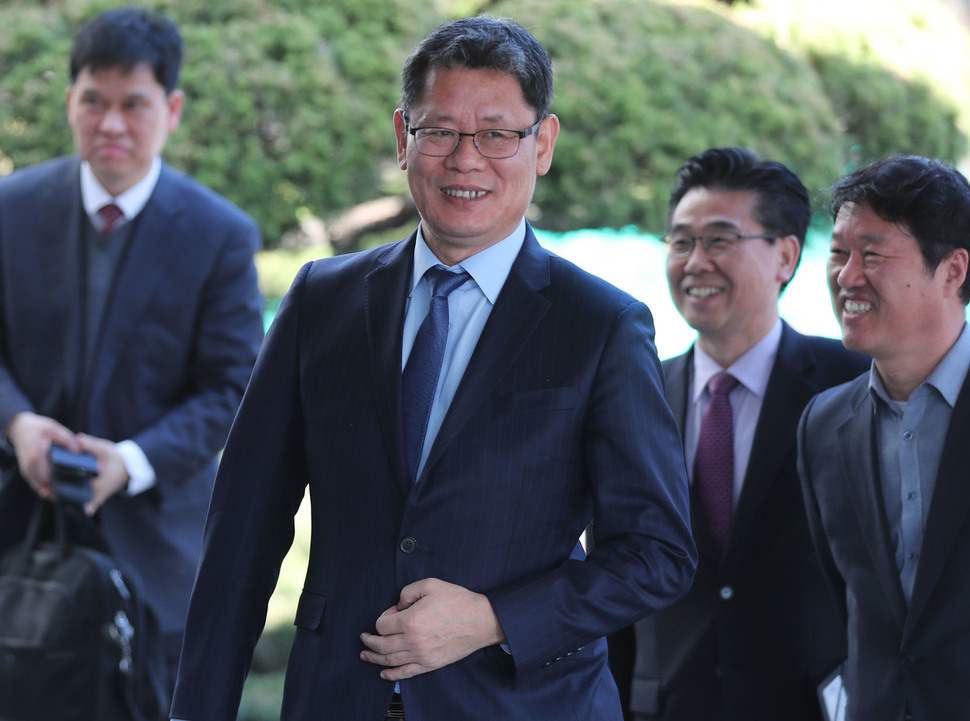 |
|
Kim Yeon-cheol, who has been nominated for Minister of Unification by President Moon Jae-in, heads to the Office of Inter-Korean Dialogue for a press conference on Mar. 8. (Baek So-ah, staff photographer)
|
Cites candidate’s opposition to THAAD and UN sanctions as justification
Liberty Korea Party (LKP) floor leader Na Kyung-won delivered a representative speech of the National Assembly negotiation group on Mar. 12, calling for President Moon Jae-in to withdraw his nomination of Kim Yeon-cheol for Minister of Unification. She cited Kim’s opposition to the deployment of a Terminal High Altitude Area Defense (THAAD) system and his criticisms of sanctions against North Korea as her reasons. “The true colors of the Moon Jae-in administration’s hatred of THAAD and North Korea sanctions are now apparent,” Na said. The grounds for the LKP’s request to withdraw the nomination represent a policy issue that is not included among the so-called “seven forms of corruption” that serve as standards for the Blue House disqualifying a candidate’s appointment to a senior-level official position (military service evasion, real estate speculation, tax evasion, falsified residential relocations, dissertation plagiarism, drunk driving, and sex crimes). Of the seven ministerial candidates for whom Moon requested confirmation hearings in the National Assembly, Kim is the only one whose withdrawal the LKP has officially requested. His upcoming confirmation hearing on Mar. 26 now looks increasingly likely to turn into a partisan battle on North Korea policy. “There may some disagreements regarding the perspectives that Mr. Kim has consistently expressed as a scholar,” acknowledged one former Minister of Unification who speaking on condition of anonymity on Mar. 18. At the same time, the former minister stressed, “Policies and visions cannot represent grounds for withdrawal.” The Hankyoreh examined Kim’s policy orientation through his past columns in the press and his most recent publication, the book “Seventy Years of Dialogue: A New Take on the History of Inter-Korean Relations” (Changbi Publishers, 2018). You can’t shake hands while making a fist Kim’s views on negotiations are summed up by the so-called “mirror theory” and the saying, “You can’t shake hands while making a fist.” In “Seventy Years,” he writes, “When you smile, the person in the mirror smiles too; when you make a fist, so does the other person. You’re the one influencing the person in the mirror” (p. 14–15). This is the reason for his emphasis on “acting first” and showing “active wisdom” in inter-Korean relations. To regard trust as a precondition for negotiations, he argues, is to put the cart before the proverbial horse. The N. Korean nuclear issue a product of the Korean Peninsula’s Cold War regime In “Seventy Years,” Kim writes that the North Korean nuclear issue “cannot be solved with a strategy and vision for ending the Cold War” (p. 296). He also stresses that the “character of the relationship must be changed.” This is why he has characterized the events since the 2018 Winter Olympics in Pyeongchang as a “Korean Peninsula peace process” and proposed “cooperative” rather than “coercive” denuclearization. This represents a major difference with the LKP, which is focused exclusively on North Korean denuclearization. Sanctions a means to an end, not an end in themselves Kim maintains that sanctions “can increase bargaining strength by negatively impacting the North Korean economy.” At the same time, he stresses that the “unintended results of sanctions” should not be overlooked – namely a “crisis of trust” and “humanitarian crisis.” In “Seventy Years,” he notes, “To [regime] collapse advocates, sanctions are an end in themselves; to negotiation advocates, they are a means to an end” (p. 289). He has also proposed considering sanctions relief as a means of shifting the nature of relations with the North and promoting denuclearization. Positive feedback loop among two Koreas and US Kim sees the “positive feedback loop of the trilateral relationship among South and North Korea and the US” as the driving force behind the two inter-Korean summits in 2000 and 2007, the three held last year, and the first-ever North Korea-US summit. In “Seventy Years,” he explains, “With the three bilateral relationships of South and North Korea, South Korea and the US, and North Korea and the US, it has a negative impact on the others when any one of them comes to a halt” (p. 10). For this reason, he stresses the importance of communication between Seoul and Washington and solidarity and agreement among South Koreans even as he points out the potential for improvements in inter-Korean relations to promote and drive denuclearization and the Korean Peninsula peace process. Peace lies within the economy Born and raised near the border with North Korea in Gangwon Province, Kim stresses the fundamental importance of peace. “Just as flowers cannot blossom without land, there can be no economy without peace,” he has said. This position is also the root of his critical stance toward US Forces Korea’s deployment of the THAAD system, which the LKP cited as grounds for requesting the withdrawal of his nomination. The deployment, he has said, signifies an “upheaval in the Northeast Asian order” that stands to ignite conflict between South Korea and China/Russia and touch off an arms race in the region, creating obstacles to resolution of the nuclear issue and the achievement of the “northern economy.” His proposal to establish a “maritime DMZ” by designating a joint fishing and maritime peace zone in the West (Yellow) Sea falls along the same lines. “The crux of the issue is that we cannot crack down on Chinese fishing boats without a ‘sea of peace’ [due to fears of an inter-Korean military clash],” he explains. By Lee Je-hun, senior staff writer Please direct comments or questions to [english@hani.co.kr]






